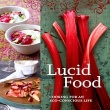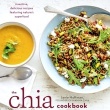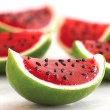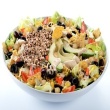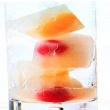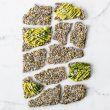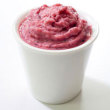Family Frowns at Veggies? Quick Tricks Get Smiles
From the American Institute for Cancer Research
Depending on childhood experiences, especially with overcooked foods, many of us have at least one unfavorite vegetable. But the least popular vegetables seem to be those that have assertive flavors, like cauliflower, broccoli and Brussels sprouts.
Too often, these veggies have earned bad reputations through no fault of their own. Sometimes it's poor quality produce: We've all encountered broccoli in the grocery store that's tinged with brown, or Brussels sprouts the size of baseballs, belying the fact that the smallest are the most succulent.
But it can also be the cook who is at fault. Not so long ago, home cooks tended to cook these vegetables until they were limp and barely green. But, when treated properly, even the least favorite vegetables can be wholeheartedly enjoyed.
The group known as cruciferous vegetables is the one that has the most assertive tastes: cabbage, cauliflower, chard, kale, mustard greens, rutabagas and turnips. But they are well worth getting to know better because they are power-packed with health-protective antioxidants, vitamins, minerals, and especially phytochemicals not found in any other vegetables.
The bitterness that so often turns the diner off is no longer an issue when these vegetables are well prepared. The most important thing to remember with this group of strong-flavored vegetables is to cook them only until just barely tender what cookbooks sometimes term "crisp-tender."
Two easy cooking techniques help retain color, shape and flavor, making them more appetizing as well as tasty. You can cook them quickly in a stir-fry or gently steam them. A key strategy to overcome resistance to unpopular vegetables is in the way they are served. You can serve them with a drizzle of a bold-tasting oil perhaps sesame oil or an olive oil flavored with lemon, garlic or chili pepper which softens the veggie's sharp taste. Another technique is to balance out the strong taste with equally assertive seasonings or a sauce. A stir-fry recipe usually includes such a sauce, which makes this technique automatic.
You can use a commercial sauce or quickly make a simple sauce like this rich-tasting balsamic glaze. Balsamic vinegar makes a flavorful base for this glaze, and the result is full-bodied yet light sauce that will work equally well, for example, with broccoli, Brussels sprouts, or cauliflower.
BALSAMIC GLAZE
1/4 cup balsamic vinegar
1 Tbsp. honey, or to taste
1 tsp. minced garlic
1 tsp. minced peeled ginger
1 tsp. extra-virgin olive oil
1 tomato, seeded and chopped
Salt and freshly ground black pepper
Combine ingredients in blender and blend just until pureed. Transfer to a non-stick saucepan. Bring mixture to a boil, then immediately reduce heat to moderate. Cook, stirring frequently, until sauce is slightly syrupy.
Check taste and if glaze seems too acidic, stir in slightly more honey. Add salt and pepper to taste, if desired.
Drizzle over hot, cooked vegetables and serve immediately, or store, covered, in refrigerator up to 3 days. Reheat and chill glaze before using.
Makes about 1 cup (1 tablespoon per serving)
Per serving: 12 calories, less than 1 g. total fat (0 g. saturated fat), 2g. carbohydrate, 0 g. protein, 0 g. dietary fiber, 2 mg. sodium
From the American Institute for Cancer Research
Depending on childhood experiences, especially with overcooked foods, many of us have at least one unfavorite vegetable. But the least popular vegetables seem to be those that have assertive flavors, like cauliflower, broccoli and Brussels sprouts.
Too often, these veggies have earned bad reputations through no fault of their own. Sometimes it's poor quality produce: We've all encountered broccoli in the grocery store that's tinged with brown, or Brussels sprouts the size of baseballs, belying the fact that the smallest are the most succulent.
But it can also be the cook who is at fault. Not so long ago, home cooks tended to cook these vegetables until they were limp and barely green. But, when treated properly, even the least favorite vegetables can be wholeheartedly enjoyed.
The group known as cruciferous vegetables is the one that has the most assertive tastes: cabbage, cauliflower, chard, kale, mustard greens, rutabagas and turnips. But they are well worth getting to know better because they are power-packed with health-protective antioxidants, vitamins, minerals, and especially phytochemicals not found in any other vegetables.
The bitterness that so often turns the diner off is no longer an issue when these vegetables are well prepared. The most important thing to remember with this group of strong-flavored vegetables is to cook them only until just barely tender what cookbooks sometimes term "crisp-tender."
Two easy cooking techniques help retain color, shape and flavor, making them more appetizing as well as tasty. You can cook them quickly in a stir-fry or gently steam them. A key strategy to overcome resistance to unpopular vegetables is in the way they are served. You can serve them with a drizzle of a bold-tasting oil perhaps sesame oil or an olive oil flavored with lemon, garlic or chili pepper which softens the veggie's sharp taste. Another technique is to balance out the strong taste with equally assertive seasonings or a sauce. A stir-fry recipe usually includes such a sauce, which makes this technique automatic.
You can use a commercial sauce or quickly make a simple sauce like this rich-tasting balsamic glaze. Balsamic vinegar makes a flavorful base for this glaze, and the result is full-bodied yet light sauce that will work equally well, for example, with broccoli, Brussels sprouts, or cauliflower.
BALSAMIC GLAZE
1/4 cup balsamic vinegar
1 Tbsp. honey, or to taste
1 tsp. minced garlic
1 tsp. minced peeled ginger
1 tsp. extra-virgin olive oil
1 tomato, seeded and chopped
Salt and freshly ground black pepper
Combine ingredients in blender and blend just until pureed. Transfer to a non-stick saucepan. Bring mixture to a boil, then immediately reduce heat to moderate. Cook, stirring frequently, until sauce is slightly syrupy.
Check taste and if glaze seems too acidic, stir in slightly more honey. Add salt and pepper to taste, if desired.
Drizzle over hot, cooked vegetables and serve immediately, or store, covered, in refrigerator up to 3 days. Reheat and chill glaze before using.
Makes about 1 cup (1 tablespoon per serving)
Per serving: 12 calories, less than 1 g. total fat (0 g. saturated fat), 2g. carbohydrate, 0 g. protein, 0 g. dietary fiber, 2 mg. sodium
- Post Reply
- Post New
- Save to Recipe Box
ADVERTISEMENT
Random Recipes from:
Toppings - Glazes
Toppings - Glazes
- Juban's Praline-Creole Mustard Glaze
- Orange Glaze for Ham
- Curry Marmalade Glaze (for chicken)
- Vanilla Glaze (for Grilled Chicken, Meat, Tofu, or Portabella Mushrooms)
- Stacy Keach's Holiday Ham Glaze
- Tangy Coconut Ham Glaze (using cream of coconut)
- Applebee's Honey Glaze
- Jack Daniels Grill Glaze and TGI Fridays BBQ Sauce (repost)
- Maple Glaze
- Cherry Almond Glaze (for ham or pork)
UPLOAD AN IMAGE
Allowed file types: .gif .png .jpg .jpeg
Allowed file types: .gif .png .jpg .jpeg
POST A REPLY
Post a Request - Answer a Question
Share a Recipe
Thank You To All Who Contribute
Post a Request - Answer a Question
Share a Recipe
Thank You To All Who Contribute
POST A NEW MESSAGE
Post a Request - Answer a Question
Share a Recipe
Thank You To All Who Contribute
Post a Request - Answer a Question
Share a Recipe
Thank You To All Who Contribute



